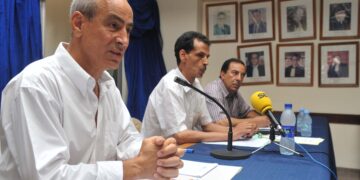Federal Bureau of Investigation Should Launch Criminal Inquiry and Seek Prosecution under the Justice for Victims of War Crimes Act
(Washington, D.C. – September 13, 2024) – The Federal Bureau of Investigation should launch a criminal investigation into the killing of Aysenur Eygi, a U.S. citizen shot by an Israeli soldier during a non-violent protest in the West Bank town of Beita on September 6, 2024, and hold all those responsible for the murder accountable under the Justice for Victims of War Crimes Act (18 U.S. Code § 2441).
In addition, the Department of State should determine whether the Israel Defense Forces (IDF) used U.S. weapons to kill her, and provide a public accounting of how many U.S. citizens the IDF has killed or injured since October 7, 2023 and the status of any U.S. investigations into these killings and injuries.
"Eygi's killing is but the latest in a decades-long pattern of Israeli forces harming, maiming, and murdering U.S. citizens whom Israel sees as Palestinian or as standing in solidarity with Palestinians, be they human rights activists, journalists, or protesters," said Sarah Leah Whitson, executive director of DAWN. "Secretary Blinken's assertion that the safety of U.S. citizens is his highest priority, while taking no action to hold the responsible Israelis accountable, is about as meaningful as offering 'thoughts and prayers.'"
An Israeli soldier shot Eygi in the head following the weekly protest in the Palestinian village of Beita, near Nablus in the occupied West Bank. According to Jonathan Pollack, eyewitness to the shooting interviewed by DAWN on September 11, 2024, there were no clashes taking place when Israeli soldiers fired two shots in quick succession, wounding a Palestinian youth and killing Aysenur. A Washington Post investigation corroborated his and other eyewitness accounts that the protest had ended some 20 minutes prior to the shooting, and that Eygi was standing over 200 meters from the soldiers and could not have posed a threat to them in any way. Beita has become a flashpoint for Israeli violence against Palestinian civilians, where Israeli forces have killed at least 17 people since 2021. Israeli forces regularly use disproportionate and lethal force against civilians exercising their right to protest and trying to protect their land against the illegal expansion of Israeli settlements.
According to Pollack, who has knowledge of the autopsy performed on Eygi and the findings medical examiners passed on to investigators, the slug doctors retrieved from her head was consistent with a .556mm bullet like those fired from American-made assault rifles like the M4 commonly used by the Israeli military. Subsequent reporting cited independent pathologists concluding that it is likely the shot struck Eygi directly in the head and did not ricochet, as the Israeli military's preliminary report claimed. DAWN was not able to ascertain what Israeli military unit was involved in the violent attack on protesters, including the killing of Eygi. Nor has the Israeli government made this information public.
"The U.S. government should demand to know what Israeli unit was responsible for killing Eygi, investigate whether they used U.S.-made weapons, and if so, consider halting all military assistance to the Israeli unit pursuant to the Leahy Law," said Michael Schaeffer Omer-Man, director of research for Israel-Palestine at DAWN. "Such accountability is critical to ensuring that U.S. weapons aren't used to perpetrate grave human rights abuses, not only against U.S. citizens but against civilians anywhere."
This killing is a stark reminder of the extrajudicial killings perpetrated by Israeli forces with impunity and no accountability for decades. Eygi is the second U.S. citizen Israeli soldiers have shot in the Palestinian village of Beita in the past month, where they also have reportedly killed 17 Palestinians since the village began protesting the expansion of a new settlement onto its land in 2021. In 2022, an Israeli sniper also targeted and killed Palestinian-American journalist Shireen Abu Akleh in Jenin, with the Israeli military later claiming her death was unintentional. In both cases, the Israeli military initially claimed that the shootings took place in the context of active hostilities, only to be quickly refuted by journalists and human rights investigators. The FBI has reportedly said it was investigating Abu Akleh's murder, but has provided no further information about the status of its investigation, two years since her killing.
Noting that this is not the first time Israeli forces have killed a U.S. citizen in the West Bank in recent years, Secretary of State Antony Blinken said on September 10, 2024 that Eygi's killing was "unprovoked" and "unjustified", and that Israel "must make some fundamental changes in the way that [Israeli forces] operate in the West Bank." The secretary did not, however, detail what those changes should entail, and whether the United States would take any steps to hold Israel accountable for its actions, or ensure that it makes the necessary changes. He also did not address how many U.S. citizens Israeli forces may have killed in the Gaza Strip in the past year.
"Telling Americans that Israel needs to 'make changes' so that it doesn't murder any more Americans is no substitute for holding the Israeli forces responsible for Eygi's murder accountable in a court of law," said Raed Jarrar, director of advocacy at DAWN. "The penalty for murder cannot be a plea not to do it again."
Israel published the results of an initial inquiry into the murder on September 10, 2024, clearing itself and its soldiers of any wrongdoing by claiming the shooting was unintentional. Unlike in the Abu Akleh case, the Israeli military stated that it will conduct a criminal investigation into Eygi's killing. However, time and again Israel has proven itself to be either unable or unwilling to investigate its own soldiers for war crimes and illegal killings credibly, transparently, and consistently. According to Israeli human rights organization Yesh Din, "the odds of a complaint regarding harm caused to Palestinians by [an Israeli] soldier culminating in an indictment filed against the soldier is just 0.87%." Likewise, the prosecutor of the International Criminal Court is currently seeking the arrest of Israeli leaders Benjamin Netanyahu and Yoav Gallant partly based on a conclusion that the Israeli justice system is unwilling or unable to investigate its country's own officials.
Under U.S. law, specifically Section 620M of the Foreign Assistance Act (called the "Leahy Law"), the United States is prohibited from providing military assistance to any foreign military unit responsible for extrajudicial killings or other serious human rights abuses. This legal provision applies irrespective of the victim's nationality, emphasizing that no U.S. funds should support units implicated in gross violations of human rights, whether the victims are American citizens or civilians of any other nationality. In this context, the United States should evaluate the entirety of Israeli actions in Beita in recent years, and in particular the 17 killings, which may amount to extrajudicial killing.
In addition, the Justice for Victims of War Crimes Act gives the U.S. government jurisdiction to prosecute war crimes committed overseas when the victim or the perpetrator is a U.S. national or permanent resident. The Justice Department most recently used the statute to prosecute Russian soldiers for torturing a U.S. citizen in Ukraine.
Given Israel's well-documented failure to thoroughly, credibly, and transparently investigate its military's violations against Palestinians and their allies, including U.S. citizens, DAWN demands the following actions from the U.S. government:
- The FBI should open an investigation into the killing of Aysenur Eygi, like it did for the IDF killing of Shireen Abu Akleh, and pursue prosecution under the Justice for Victims of War Crimes Act, as it has for Americans tortured by Russia.
- The State Department should launch an inquiry to determine if Israel used U.S.-supplied weapons in the commission of this killing. The U.S. government should publicly identify the Israeli military unit responsible for Eygi's death, and subsequently evaluate whether it has carried out gross violations of human rights that would disqualify the unit from further U.S. assistance pursuant to the Leahy Law.
- The Administration should publicly announce steps it is taking to prevent Israel from using U.S.-supplied weapons to kill not only American citizens, but civilians in general. This should include deploying its full diplomatic weight to achieve an immediate and permanent ceasefire in Gaza, and restricting the provision of military assistance to Israel, in accordance with U.S. laws that prohibit aid to countries that are responsible for gross violations of human rights.
- The State Department should provide a comprehensive accounting of how many U.S. citizens have been killed or injured by Israeli forces or their proxies, including settlers, since October 7, 2023, in both Gaza and the West Bank; the steps it has taken to investigate the circumstances of these killings and injuries; and the measures it has taken to hold accountable those responsible for unlawful killings and injuries.





































